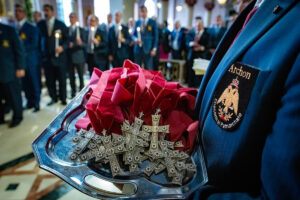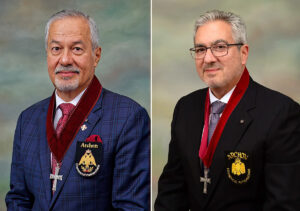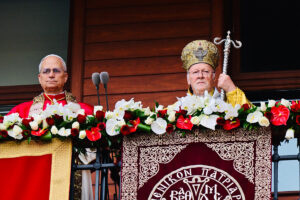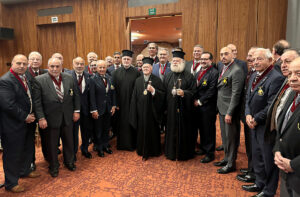A published report issued by the European Parliament stresses that Turkey’s denial of the Ecumenical Patriarchate’s “cultural and spiritual importance” as well as its “religious jurisdiction much beyond Turkey’s borders” threatens the very “survival of the institution.”
Requested by the European Parliament’s Committee on Foreign Affairs, “Religious Freedom in Turkey: Situation of Religious Minorities” was compiled by a group of professors and researchers of the Center for European Studies and documents the continuing persecutions and restrictions of non-Muslim religious minorities by the Turkish government.
The manuscript, completed in late February, begins with an historical outlook on minority issues in Turkey and examines the Armenian, Jewish, and Greek Orthodox communities. It reviews the historic events which led to the decreasing population of the Greek community and closing of properties owned by the Ecumenical Patriarchate, stating:
“The Greek Church and its highest authority the patriarchate of Constantinople have also been affected from the state’s suspicious stance. The Turkish state does not acknowledge the Patriarchate as a legal entity. One of the currently most discussed issues in this context is probably the Halki priest seminary which was closed in 1971. Turkish officials have made it clear that they are following the principle of reciprocity, which means that the situation of the Greek minority has been made dependent from that of the situation of the Muslim minority in Greece.”
The report then questions Turkey’s position on the “Ecumenical” character of the Ecumenical Patriarchate, stating:
“Whereas the Greek Orthodox Patriarchate claims its ecumenical character, a ranking as the primus inter pares among the Orthodox Churches, the Turkish state has refused to acknowledge the Patriarch’s spiritual leadership of the world wide Orthodoxy, but merely regards him as the head of the Greek Orthodox minority in Turkey.
“State authorities have often argued that any recognition of the ecumenical nature of the patriarchate might result in the establishment of an entity with legal international status which would then set the patriarch in a position comparable to that of a head of state. Any special status has been denied by Turkish authorities as they have seen it conflicting with the principle of secularism and as a backdoor for pro-Greek agitation and therefore as a threat to national security. Turkish nationalists have seen the patriarchate’s insistence on its ecumenical character as a proof for its political orientation.
“It was also the fear that the Patriarchate might not confine itself to mere religious questions but would also act as a political body which had driven the Turkish delegation in Lausanne (1923) to ask for the Patriarchate’s removal. Whereas the treaty does not include any explicit mention of the status of the Patriarchate, it is a point of reference for advocates and opponents of its ecumenical title.
“On June 26, 2007, the Turkish Supreme Court of Appeals (Yargitay) ruled (2007/5603) in the question of the ecumenical character of the patriarchate that the Phanar Greek Patriarchate (Fener Rum Patrikhanesi) was merely the representative of the church of the Greek minority in Turkey, that it was granted the right to remain in Turkey and that it was subject to Turkish law. The ruling stipulated that any special rights or privileges granted to a minority but denied to its own citizens would violate the constitutional principle of equality. Referring to the Treaty of Lausanne, the court declared that as there was no explicit mention of the patriarchate, there was also no legal ground for the claim for the title of an ecumenical patriarchate.
“It is the state’s denial of the Patriarchate’s cultural and spiritual importance and influence and its religious jurisdiction much beyond Turkey’s borders which risks, in the light of a dwindling Greek Turkish minority, the survival of the institution. Considering the low numbers of Greek Turkish citizens remaining in the country, it will be increasingly difficult to meet the requirements stipulated in the decrees issued in 1923 and in 1970 laying down that not only the patriarch has to be a Turkish citizen, but also those who elect him and that they have to be carrying out ecclesiastical duties within Turkey.
It has been the Turkish interpretation of secularism which does not provide the opportunity of legal personality for religious institutions. The Turkish state’s denial of a legal personality of the Patriarchate results in the non-recognition of its ownership rights. Ownership has to be registered in foundations. However, properties might be still dispossessed when they are not used for their original purpose. The Patriarchate has no legal means to seek legal action against such infringements.”
The report concludes, saying:
“The closing down of the Halki priest seminary in 1971 has virtually stopped the education of young generation clergymen for the Greek community in Turkey. The Armenian seminary was closed down in 1974. The Turkish state could be encouraged to handle this pressing issue of the clergymen of the religious communities.”
The European Parliament report can be read in its entirety here:
www.europarl.europa.eu/activities/committees/studies/download.do?file=20808






